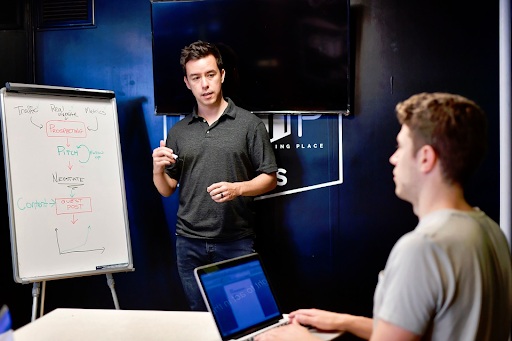Code Crafters: Unraveling the Dynamic World of Software Development Careers

In the fast-paced realm of software development, professionals create, maintain, and improve the digital tools that power our lives. From mobile apps and video games to artificial intelligence and cloud computing, the software development industry offers a diverse array of career paths for those with a passion for technology. In this article, we’ll explore the various roles within the software development ecosystem, the skills required, and the exciting job opportunities available to those who choose to dive into this dynamic world.
Table of Contents
- The Landscape of Software Development Roles
- Key Skills for Software Developers
- How to Get Started in a Software Development Career
- Trends Shaping the Future of Software Development Careers
- Salary Expectations and Job Satisfaction
1. The Landscape of Software Development Roles
From front-end developers to data scientists, software development professionals wear many hats. Here’s a rundown of some of the most in-demand roles in the industry:
Front-End Developer
Front-end developers are responsible for designing and implementing the user interface of web applications. They work with HTML, CSS, and JavaScript to create visually appealing and functional websites.
Back-End Developer
Back-end developers handle the server-side logic of web applications, ensuring that data is properly stored, retrieved, and processed. They work with databases, servers, and application programming interfaces (APIs) using languages like Java, Python, Ruby, and PHP.
Full-Stack Developer
Full-stack developers have the skills to work on both the front-end and back-end of a web application. These versatile developers are highly sought-after, as they can take on tasks across the entire software development process.
Mobile App Developer
Mobile app developers create applications for smartphones and tablets, using platforms like iOS, Android, and React Native. They must consider the unique constraints and capabilities of mobile devices, ensuring a seamless user experience.
Data Scientist
Data scientists analyze large datasets to gain insights and solve complex problems. They use techniques such as machine learning, data mining, and statistical analysis to create models that can predict trends or guide decision-making.
DevOps Engineer
DevOps engineers bridge the gap between software development and IT operations, ensuring a smooth and efficient software delivery pipeline. They work with tools like Docker, Kubernetes, and Jenkins to automate and streamline processes.
2. Key Skills for Software Developers
Regardless of the specific role, software developers need a strong foundation in certain core skills:
- Programming Languages: Mastering one or more programming languages (e.g., Java, Python, JavaScript) is crucial for any software development career;
- Problem Solving: Developers must be able to break down complex problems, identify the root cause, and devise solutions;
- Collaboration: Software development is often a team effort, so strong communication and teamwork skills are essential;
- Adaptability: Technology evolves rapidly, so developers must be prepared to continually learn and adapt to new tools and techniques.
3. How to Get Started in a Software Development Career
If you’re considering a career in software development, follow these steps to get started:
- Choose a Focus: Determine which role or niche within software development interests you the most;
- Learn the Basics: Gain a strong foundation in programming languages, data structures, and algorithms;
- Build a Portfolio: Create projects to showcase your skills and demonstrate your ability to solve real-world problems;
- Network: Attend industry events, join online communities, and connect with professionals in your chosen field;
- Pursue Education: Consider obtaining a degree in computer science, software engineering, or a related field. Alternatively, explore coding bootcamps or online courses to acquire specific skills;
- Apply for Internships: Gain practical experience and make valuable connections by interning at a software company or working on open-source projects;
- Prepare for Interviews: Research common interview questions, practice coding challenges, and refine your soft skills to excel in job interviews.
4. Trends Shaping the Future of Software Development Careers
As technology continues to evolve, software developers must stay up-to-date on emerging trends and technologies that will shape the future of their careers. Some of the most significant trends include:
- Artificial Intelligence (AI) and Machine Learning (ML): AI and ML are revolutionizing industries and creating new opportunities for software developers skilled in these areas;
- Cloud Computing: As more companies migrate to the cloud, developers with expertise in cloud-based technologies and platforms will be in high demand;
- Cybersecurity: The increasing prevalence of cyberattacks highlights the need for developers who can create secure software and protect sensitive data;
- Remote Work: The shift towards remote work is changing how software teams collaborate, making it crucial for developers to adapt to new communication and project management tools.
5. Salary Expectations and Job Satisfaction
Software development is often considered a lucrative field, with competitive salaries and strong job growth. According to the U.S. Bureau of Labor Statistics, the median annual wage for software developers was $110,140 in May 2020, with employment projected to grow 22% from 2020 to 2030. Keep in mind that salaries can vary significantly depending on factors such as location, experience, and the specific role.
In addition to financial rewards, software development careers offer job satisfaction through creative problem solving, the opportunity to work on cutting-edge technologies, and the chance to make a meaningful impact on people’s lives. With a wealth of roles, skills, and technologies to explore, there’s never been a better time to embark on a career in software development.
